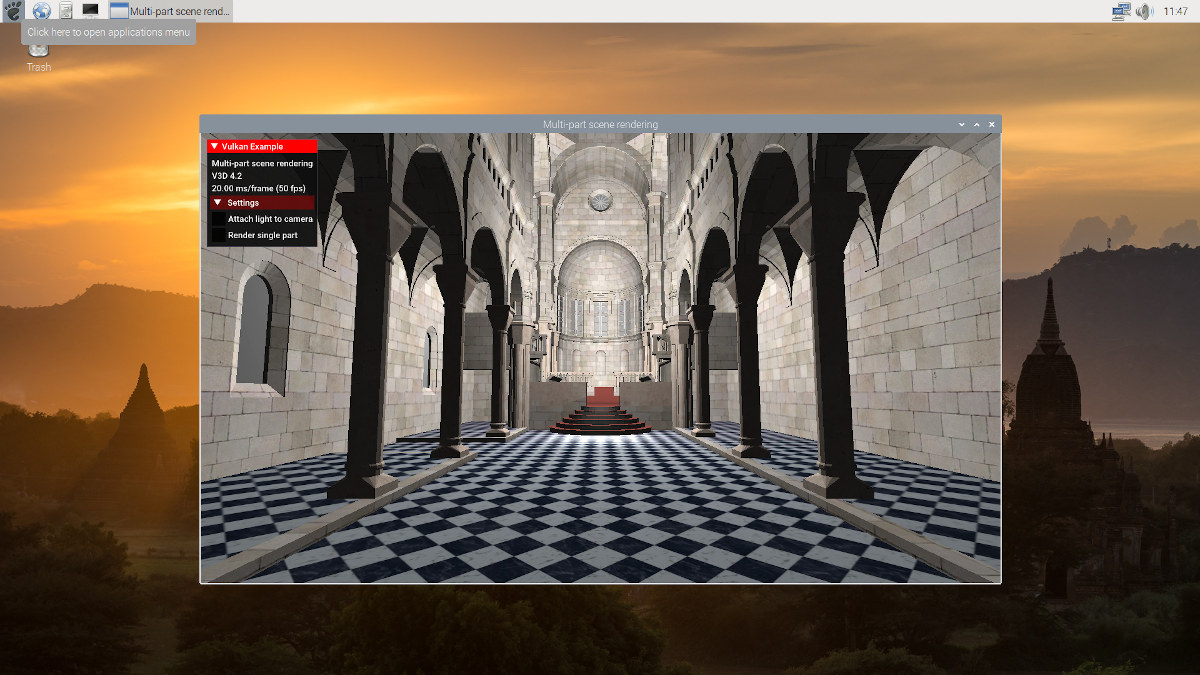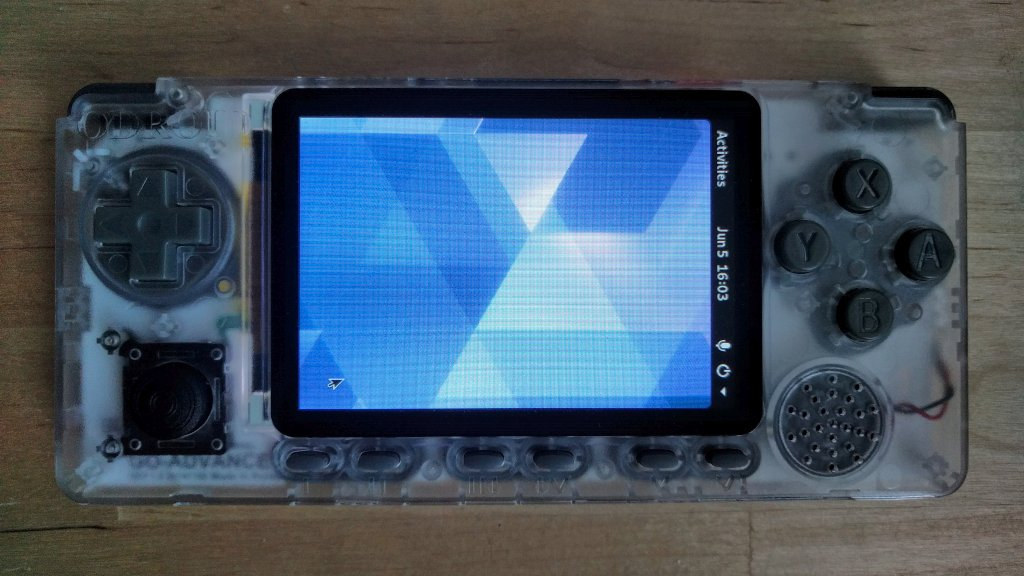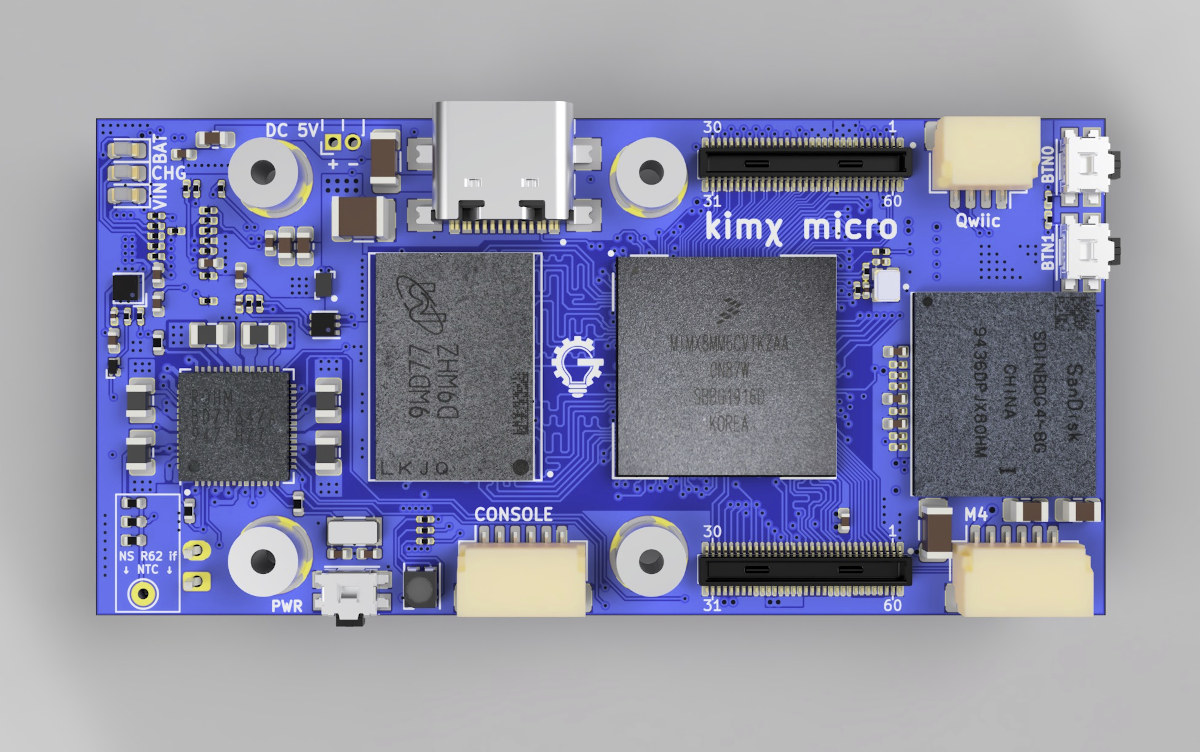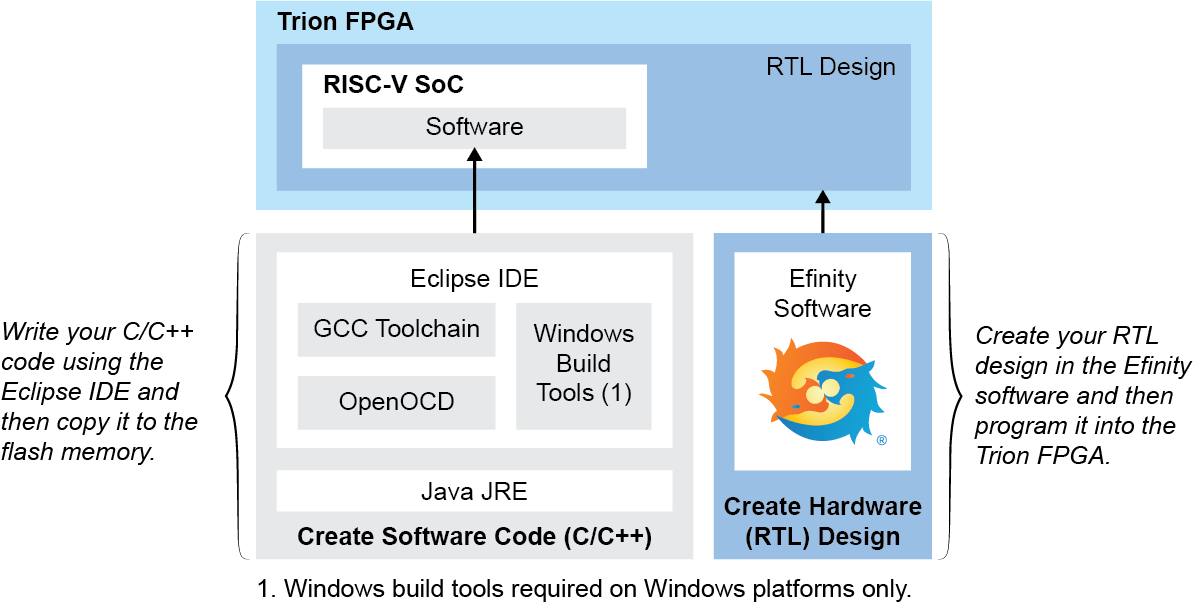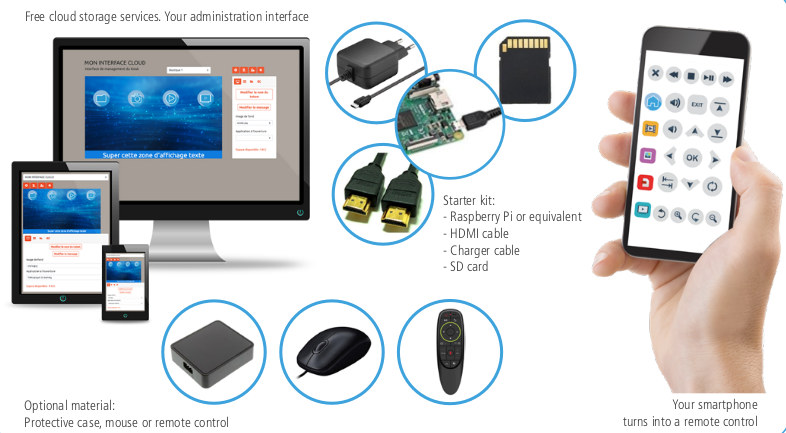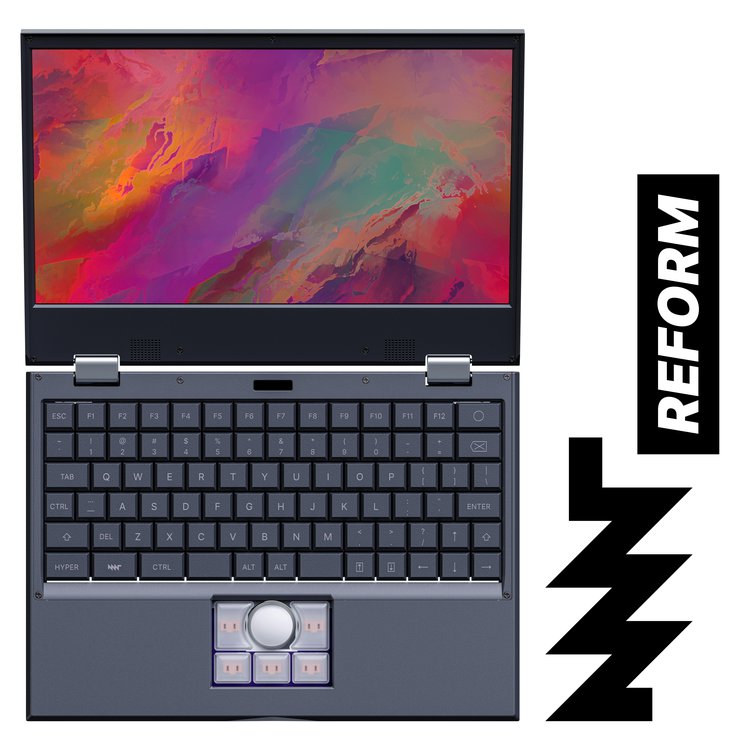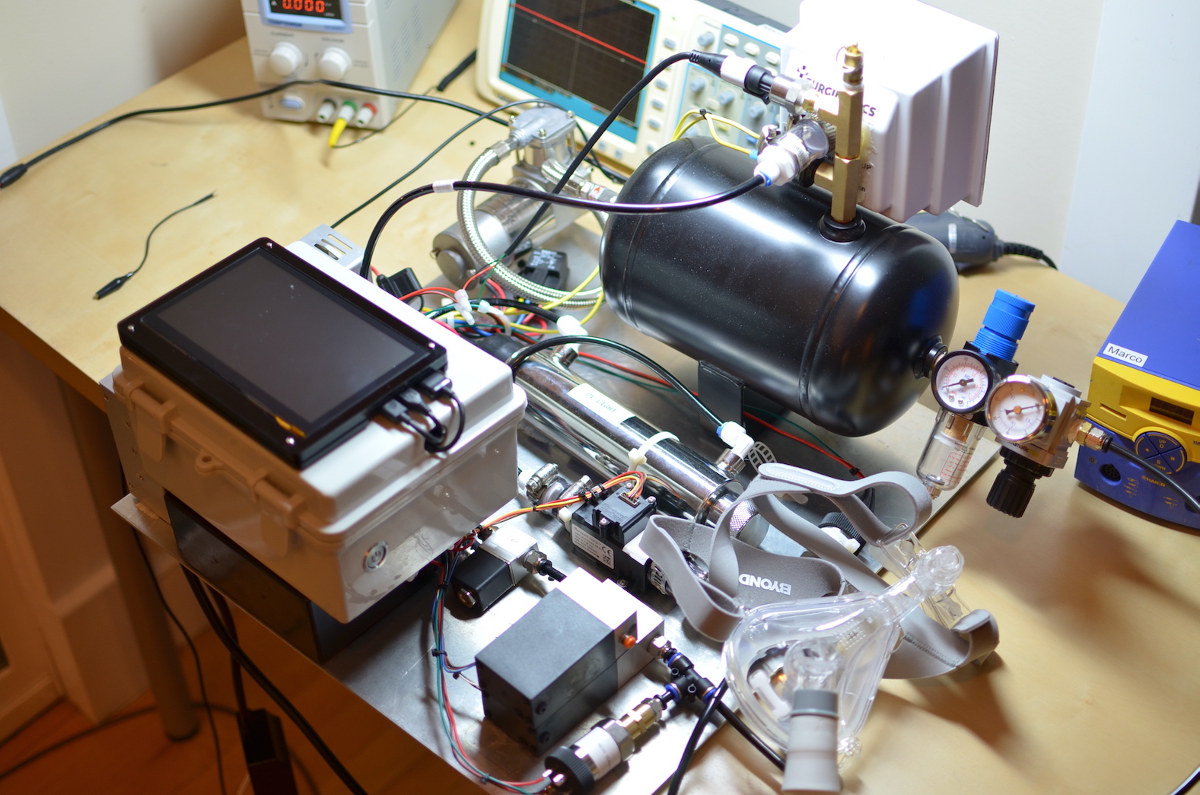The Raspberry Pi Foundation announced they had started working on Vulkan support for Raspberry Pi 4 in January with the initial implementation being able to render the “hello world of graphics”, i.e. a basic triangle. Progress are been made with the Mesa 3D library been able to render more complex demos, specifically Sascha Willems Vulkan demos. That’s encouraging, but the current Vulkan implementation is still not usable to play games on Raspberry Pi, and some of Sascha’s Vulkan demos are still not working at the time of writing. Yet the list of working demos is fairly long: distancefieldfonts descriptorsets dynamicuniformbuffer gears gltfscene imgui indirectdraw occlusionquery parallaxmapping pbrbasic, pbribl, pbrtexture pushconstants scenerendering shadowmapping, shadowmappingcascade specializationconstants sphericalenvmapping stencilbuffer textoverlay texture, texture3d, texturecubemap triangle vulkanscene The other good news is that Igalia and the Raspberry Pi Foundation have now released the source code of v3dv fork of Mesa library on Freedesktop Gitlab so […]
GNOME Renders on Arm Mali-G31 Bifrost GPU with Fully Open Source Code
We first wrote about Panfrost open-source Arm Mali GPU driver getting initial support for Mali-G31 Bifrost GPU in late April, when engineers at Collabora managed to run some basic demos. Progress has been fast-paced as the company has now implemented support for all major features of OpenGL ES 2.0 and some features of OpenGL 2.1. That means hardware-based on Arm Mali-G31 GPU such as ODROID Go Advance (used for testing) can run Wayland compositors with zero-copy graphics, including GNOME 3, every scene in glmark2-es2 benchmarks, and some 3D games such as Neverball. All without any binary blobs. The company also claims to support hardware-accelerated video players mpv and Kodi. The way it should work is that while Panfrost driver renders the user interface, Amlogic open-source video decoder developed by BayLibre handles hardware video decoding. All changes are already included in upstream Mesa with no out-of-tree patches required, and Bifrost support […]
Raspberry Pi Zero Sized Kimχ Micro SBC is Equipped with a Quad-Core Processor, an mPCIe Slot
The Raspberry Pi Zero (W/WH) board is great because of its size, price tag, and software support, but processing power is limited with Broadcom BCM2735 SoC only offering a single ARM11 core clocked at 1 GHz. There are already some more powerful boards in a similar form factor include Banana Pi M2 Zero or FriendlyELEC NanoPi Duo2 both equipped with an Allwinner quad-core Cortex-A7 processor, but there’s another upcoming board with NXP i.MX 8M Mini quad-core 64-bit Cortex-A53 processor. Meet Kimχ Micro (pronounced Kimchi Micro). Kimχ Micro (preliminary) specifications: SoC – NXP i.MX 8M Mini single to quad-core Cortex-A53 processor @ up to 1.8 GHz, Cortex-M4F real-time core @ up to 400 MHz, Vivante GC NanoUltra 3D GPU + GC320 2D GPU, VPU for 1080p60 video decoding and encoding; (Single and dual-core version of NXP i.MX 8M Mini processor are also compatible) System Memory – 2GB LPDDR4 Storage – 8GB […]
Efinix Releases Three RISC-V Software-Defined SoC’s Optimized for Trion FPGA’s
Efinix has announced three RISC-V Software-defined SoC’s based on Charles Papon’s VexRiscv core and optimized for the company’s Trion T8 to T120 FPGA’s. VexRiscv is a 32-bit RISC-V CPU using RISCV32I ISA with M and C extensions, has five pipeline stages (fetch, decode, execute, memory, and writeback), and a configurable feature set. Each SoC includes a RISC-V core, memory, as well as various I/O and interfaces. Key features for each of three RISC-V SoC’s: Ruby SoC FPGA footprint – ~12K LEs/78 RAM blocks Performance – 50 MHz (1.16 DMIPS/MHz) Memory – 4 KB on-chip RAM, up to 3.5 GB DDR DRAM Peripherals – 16x GPIO, Timer, PLIC, 3x SPI masters, 3x I2C masters/slaves, 2x UARTs 1x AXI4, 2x APB3 user peripherals Target applications – real-time system controls and image signal processing. Jade SoC FPGA footprint – ~7K LEs/93 RAM blocks Performance – 50 MHz (1.2 DMIPS/MHz) Memory – 32 KB […]
EasyDK Open Source Cloud Media Platform is Made for Raspberry Pi 3/4
French startup MMPhygital has developed EasyDK (Easy Digital Key) open-source, Python-based cloud media platform designed for Raspberry Pi 3 & 4 SBC’s that allows users to manage and view media content from local storage or cloud storage (2GB free) using a web management interface. The solution acts as a media center with the interface providing access to movies, video streaming, and photos, but you can also display documents such as Microsoft Office files or PDF presentations. Other features include: Dynamic display – manage a network of connected screens remotely (similar to Digital Signage solution) Remote office- Connect to a remote computer using AnyDesk plugin Add-Ons – Add your own module Cloud management – Control EasyDK remotely using the cloud platform to deploy media, launch content automatically, etc.. BLE / IP remote control – Use your smartphone as a Bluetooth or IP remote control Wireless external hard drive Secure Internet Access […]
MNT Reform Open Source Hardware Laptop Launched for $999 and Up (Crowdfunding)
MNT Reform DIY Arm Linux laptop has been in the works at least since 2017. The open source hardware laptop is also fully modular with Boundary Devices Nitrogen8M SoM featuring NXP i.MX 8M quad-core Cortex-A53 processor and 4GB RAM, M.2 NVMe SSD storage, and standard, replaceable 18650 batteries. The good news is the laptop is now almost ready for prime-time and has been launched on Crowd Supply with price starting at $999 in DIY kit form without storage, and $1,300 for a complete, assembled system with 256GB NVMe storage. If you don’t have that amount of money to spend, but would like to support the project, a $40 MNT Reform T-shirt is also offered. Alternatively, the motherboard only goes for $550. Here’s a reminder of MNT Reform specification: SoM – Boundary Devices Nitrogen8M SoC – NXP i.MX 8MQuad quad-core Cortex-A53 processor @ 1.5 GHz, 1x Arm Cortex-M4F real-time core Vivante […]
Panfrost Gets First 3D Renders on Bifrost GPU (Mali-G31) including Basic Texture Support
Collabora has been working on Panfrost open-source Arm Mali GPU driver for over a year. The drive aims to support both Midgard and Bifrost families. But so far, the company had mostly focused on Midgard (Mali-T6xx/T7xx) GPUs with for example experimental OpenGL ES 3.0 support announced last February. Collabora engineers, such as Alyssa Rosenzweig, have now started to work on Bifrost support, and some good progress has been made since they managed to have Panfrost render the first 3D graphics with basic texture support using a platform with an Arm Mali-G31 GPU. Alyssa notes that while Midgard and Bifrost have a similar command stream requiring a few changes, the Bifrost instruction set is completely different and required building a new compiler from scratch. This leads to changes to the Intermediate Representation (IR), 16-bit data support, a different register allocation mechanism due to adapt to irregular vector architectures, and the latter […]
Raspberry Pi powered Ventilators and 80+ Open Source Ventilators Listed & Ranked
With the (potential) shortage of ventilators due to COVID-19 pandemic, people have been working together to create cheaper and/or open-source ventilators, and we previously covered a smartphone-powered ventilator, as well as an open-source Arduino ventilator. It should come as no surprise some companies have started to make ventilators powered by Raspberry Pi boards. Raspberry Pi Zero Production Ramped up for Ventilators Tom’s Hardware reports the Raspberry Pi Foundation is specifically ramping up production of the $5 Raspberry Pi Zero because manufacturers are indeed integrating the tiny SBC into ventilators. Eben Upton, CEO and Founder of Raspberry Pi Foundation/Trading, explains: One of the main challenges with rapidly scaling manufacture of products like this is that you may be able to surge production of the air-handling elements, but you still need to provide the control element: often the components you need are on 20-week lead times and (hopefully) we’ll be out of […]


